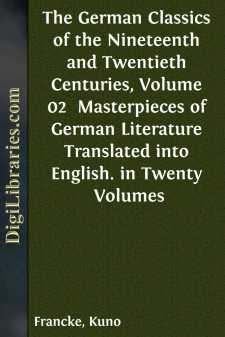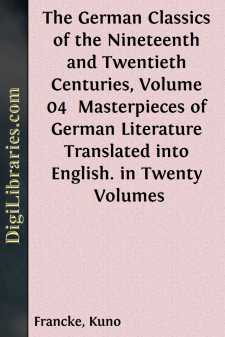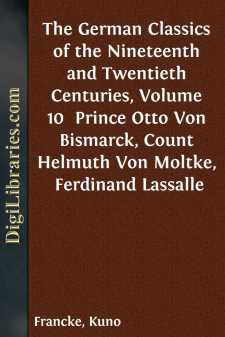Categories
- Antiques & Collectibles 13
- Architecture 36
- Art 48
- Bibles 22
- Biography & Autobiography 813
- Body, Mind & Spirit 142
- Business & Economics 28
- Children's Books 17
- Children's Fiction 14
- Computers 4
- Cooking 94
- Crafts & Hobbies 4
- Drama 346
- Education 46
- Family & Relationships 57
- Fiction 11829
- Games 19
- Gardening 17
- Health & Fitness 34
- History 1377
- House & Home 1
- Humor 147
- Juvenile Fiction 1873
- Juvenile Nonfiction 202
- Language Arts & Disciplines 88
- Law 16
- Literary Collections 686
- Literary Criticism 179
- Mathematics 13
- Medical 41
- Music 40
- Nature 179
- Non-Classifiable 1768
- Performing Arts 7
- Periodicals 1453
- Philosophy 64
- Photography 2
- Poetry 896
- Political Science 203
- Psychology 42
- Reference 154
- Religion 513
- Science 126
- Self-Help 84
- Social Science 81
- Sports & Recreation 34
- Study Aids 3
- Technology & Engineering 59
- Transportation 23
- Travel 463
- True Crime 29
Kuno Francke
Kuno Francke (1855-1930) was a German-American scholar, historian, and educator known for his contributions to the understanding and promotion of German culture in the United States. He was a prominent faculty member at Harvard University, where he served as a professor of German literature and history, and was instrumental in the founding of the Germanic Museum (now the Busch-Reisinger Museum) at Harvard. Francke authored numerous works on German history and literature, including "A History of German Literature as Determined by Social Forces," which highlighted the social contexts shaping literary developments.
Author's Books:
Sort by:
by:
Kuno Francke
CHAPTER I Edward—so we shall call a wealthy nobleman in the prime of life—had been spending several hours of a fine April morning in his nursery-garden, budding the stems of some young trees with cuttings which had been recently sent to him. He had finished what he was about, and having laid his tools together in their box, was complacently surveying his work, when the gardener came up and...
more...
by:
Kuno Francke
The last two volumes of this comprehensive publication are devoted to the living, the writers of the present who sow the seed from which shall grow the future of German letters. But who can speak of prophecy or prevision, at a moment when all who call themselves German are compelled to fight for their existence, and the future of German nationality as well as of German culture is hidden by the smoke of...
more...
by:
Kuno Francke
THE LIFE OF GOETHE BY CALVIN THOMAS, LL.D. Professor of Germanic Languages and Literatures, Columbia University Goethe, the illustrious poet-sage whom Matthew Arnold called the "clearest, largest, and most helpful thinker of modern times," was born August 28, 1749, at Frankfurt on the Main.[2] He was christened Johann Wolfgang. In his early years his familiar name was Wolfgang, or simply Wolf,...
more...
by:
Kuno Francke
THE LIFE OF JEAN PAUL By BENJAMIN W. WELLS, Ph.D. Author of Modern German Literature. "The Spring and I came into the world together," Jean Paul liked to tell his friends when in later days of comfort and fame he looked back on his early years. He was, in fact, born on the first day (March 21) and at almost the first hour of the Spring of 1763 at Wunsiedel in the Fichtelgebirge, the very heart...
more...
by:
Kuno Francke
THE LIFE OF SCHILLER BY CALVIN THOMAS, LL.D. Professor of Germanic Languages and Literatures, Columbia University He kept the faith. The ardent poet-soul, Once thrilled to madness by the fiery gleam Of Freedom glimpsed afar in youthful dream, Henceforth was true as needle to the pole. The vision he had caught remained the goal Of manhood's aspiration and the theme Of those...
more...
by:
Kuno Francke
BISMARCK AS A NATIONAL TYPE[1] BY KUNO FRANCKE, PH.D., LL.D., Litt.D. Professor of the History ofGerman Culture, Harvard University. No man since Luther has been a more complete embodiment of German nationality than Otto von Bismarck. None has been closer to the German heart. None has stood more conspicuously for racial aspirations, passions, ideals. It is the purpose of the present sketch to bring out...
more...
by:
Kuno Francke
In the little town of Rodez, situated on the western side of the Cévennes and washed by the waters of the river Aveyron, there lived a lawyer by the name of Fualdes, a commonplace man, neither good nor bad. Notwithstanding his advanced age, he had only recently retired from affairs, and his finances were in such a bad shape that he was obliged, in the beginning of the year 1817, to dispose of his...
more...








